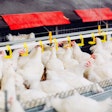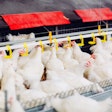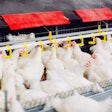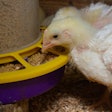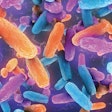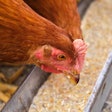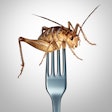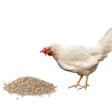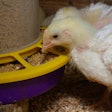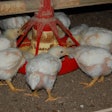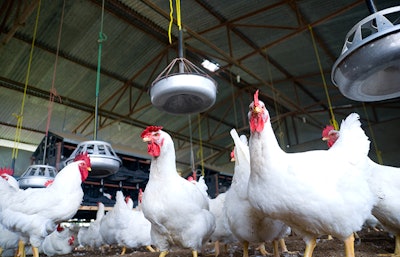
Gut health plays a crucial role in maintaining poultry welfare and health in no antibiotic ever production programs.
“In NAE programs, because we don’t have that stable gut population, we have about a half percent more mortality than we would in a conventional program. So, right there, you’re impacting your sustainability and welfare,” Francene Van Sambeek, DVM, Elanco technical consultant, explained.
Poultry raised in NAE production programs tend to be more susceptible to pathogens like C. perfringens, the causative agent for necrotic enteritis, and coccidiosis.
In addition, an unstable gut environment typically leads to higher level of ammonia in the litter, which can result in respiratory issues.
More of half of all the chicken produced by the U.S. broiler industry in 2020 was raised without the use of antibiotics in 2020, up from less than 3% in 2013. Antibiotic use in feed animals has become controversial in recent years due to growing consumer and regulatory concerns about the development of antimicrobial resistant bacteria.
Sambeek shared several strategies to promote good poultry gut health without the use of antibiotics:
Keep water lines clean
Constant access to clean, available water is one of the easiest ways to promote poultry gut health.
“Something that people don’t think about is that every time you put a product or medication to run through that water line, you’re potentially adding a biofilm,” she noted, adding that biofilms can pose several threats to flock performance, health and well-being.
Vaccinate against coccidiosis
Controlling coccidiosis in an antibiotic-free environment can be extra challenging. Coccidiostats, one of the more common approaches to controlling coccidiosis, cannot be used because they are considered a antibiotic.
This leaves vaccination, which are easy to use, widely available and can be applied at the hatchery.
“The problem with vaccines is that they strictly rely on the bird’s immune system to respond to a vaccine. So, if the birds are stressed in any way or the gut is compromised where the vaccine is taken in, we don’t get a good immune response and we may get a coccidiosis outbreak in the flock,” Van Sambeek said.







